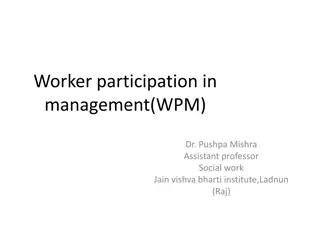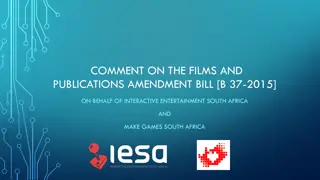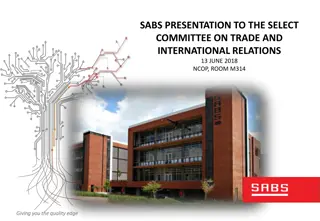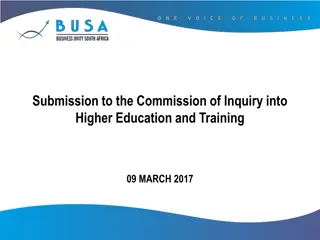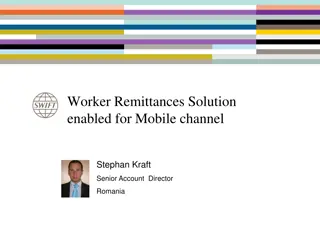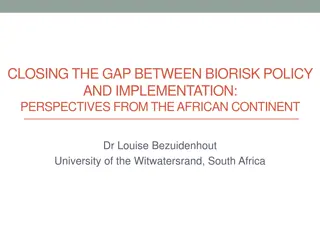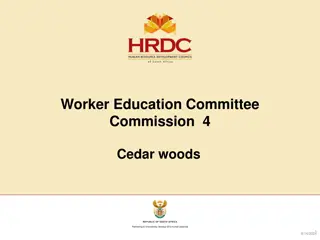Challenges and Perspectives on Worker Education in South Africa
The article delves into the challenges faced by the working class in the context of capitalism, neoliberalism, and gender inequalities in post-apartheid South Africa. It examines the impact of economic crises, political challenges, and the changing dynamics within the labor movement on worker education initiatives. The narrative highlights the need for increased funding and support for worker education to empower the working class amidst shifting ideological landscapes.
Download Presentation

Please find below an Image/Link to download the presentation.
The content on the website is provided AS IS for your information and personal use only. It may not be sold, licensed, or shared on other websites without obtaining consent from the author. Download presentation by click this link. If you encounter any issues during the download, it is possible that the publisher has removed the file from their server.
E N D
Presentation Transcript
The Contested Meaning of Worker Education (a critique) an LSOs Perspective Chris Hani Institute Workers College DITSELA NALEDI WWMP
Introduction 2 the history of all hitherto existing society is the history of class struggles (Marx & Engels, [1848] 2008) Philosophers have hitherto only interpreted the world in various ways; the point is to change it (Marx, 1968)
Context and Challenges 3 The working class is bearing the brunt of the unresolved economic crisis of capitalism retrenchments, informalisation of work, intensification of work and exploitation. Working conditions are atomising working class consciousness and undermining their collective participation in struggles and workers education.
Context and Challenges 4 We face significant political challenges in post-apartheid SA, with the neoliberal class project, syndicated thievery by the collusion of the state with private capital in the form of crass state capture. The appropriation and hegemony of the skills development agenda by human capital theory, in which skills needs are determined by employers for profit, and not basic needs and building worker organisation.
Context and Challenges 5 Persisting gender inequalities, oppression of women, the scourge of gender-based violence and abuse of children, and workplace discrimination. There is inadequate funding and support for worker education by the State, with a relatively small allocation of national resources Many Labour Service Organisations are facing funding challenges and possible closures despite the valuable services they offer to the working class
Conjunctural Challenges 6 The waning strength of the labour movement and its constituent trade unions, muting the working class responses to the capitalist crisis. The rise of trade union officialdom and bureaucracy, displacing worker control and promoting hierarchy, with a growing social distance between members and leaders. Growing fragmentation in the labour movement, with rampant factionalism and divisions, emanating from individual interests of labour elites.
Conjunctural Challenges 7 Resulting dilution of the historic mission and practice of worker education, with the onslaught of neoliberal ideology, growing individualism and fixation on accredited programmes for individual advancement. Trade Unions have not prioritised worker education, National, Provincial and Local education structures are not funded nor adequately capacitated.
Conjunctural Challenges 8 Outsourcing of much of worker education to private providers (often not even to LSOs) with unions disengaged from guiding curriculum and content. Trade unions have not made significant progress, and in some cases have experienced reversals, in negotiating paid time-off for education and training
Who is a Worker? 9 A worker is anyone who sells their labour and its reproductive extension, whether directly as a wage earner or indirectly in the reproductive sphere (unpaid labour, including caring for and rearing children). Workers include informal and formal, vulnerable workers, employed and unemployed.
Defining Worker Education 10 Worker education is education of workers by workers, workers organisations and their institutions for purposes that workers themselves determine. It must be worker-controlled and working-class orientated with a core objective of building working class unity, collective organisation and solidarity. Worker education is democratic in practice, using participatory, active methods that recognise and value workers knowledge and experience. It is aimed at building working class consciousness for the purpose of advancing working class struggles for progressive alternatives and against capitalism. (NALEDI Report, 2018: 23)
Aims & Purposes of Worker Education 11 It is part and parcel of building the unity and struggles of the working class in the workplace, in industry, in our local communities and in society. It has a specific working class orientation for workers control. It instils critical thinking & collectivism, deconstructs dominant ideas and develops alternative education practices. It helps us learn from history (and past experiences).
Aims, Purposes of Worker Education 12 It must represent the voice of all sections of the working class. It must help the working class to articulate a common vision of social transformation and articulate alternative approaches to development. It must help the working class create its own intellectuals, rooted in the struggles of workers.
Defining Values of Worker Education 13 Worker Education is Democratic It is geared towards building a democratic Movement / Organisations It is guided by collective solidarity in struggle It recognises workers knowledge and experiences It develops working class consciousness It is creative and innovative It champions creating alternatives, visioning and dreaming
Defining Features of Worker Education 14 Worker Education is controlled by workers for their own needs and purposes Worker Education empowers workers, the working class and their organisations with knowledge, understanding and skills to challenge the system of capitalism and the dominant forms of knowledge that maintain the system Worker Education must lead to working class unity and solidarity (NALEDI Report, 2018: 23)
Methodologies in Worker Education 15 The participatory approach in worker education as espoused by Paulo Freire in the Pedagogy of the Oppressed. Freire attacked the notion that students were empty vessels to be filled with information and existing knowledge (NALEDI Report). The facilitator s role is to enable a genuinely participatory learning process where participants share their experiences and knowledge they already have (CHI Roundtable, pp. 15) Worker education values and promotes collective learning, both in form and practice (NALEDI Report). The approach discourages individualized competition among learners which is typical of capitalist schooling system.
Contesting Approaches 16 Emancipatory approach Human capital approach Workers are viewed as citizens and social agents for change Workers are viewed as commodities for profit View of workers Emancipatory education for collective empowerment and social transformation Linked to the workplace and workers struggles Skills for productivity Individual access to social mobility Academic institutions and skills development institutions Objective Educational Setting Pedagogy (Educational Practice and Methodology) Collaborative and values worker knowledge Expert driven
Critique of Human Capital Theory 17 Within human capital theory, workers only value is in production for profits According to this approach, the reason for high levels of unemployment is attributed to a lack of skills, whereas in fact we have a jobs crisis not a skills crisis Unemployment is the result of structural deficiencies in the capitalist economy The human capital approach focuses on individual competitiveness rather than collective empowerment
An alternative to the 3 pillar model 18 The Workers College developed an alternative to the 3 pillar model (which problematically brings together contradictory and competing views of worker education) The alternative approach rather views worker education as a continuum of a range of forms of education, including emancipatory, vocational, political and organisational education) But what distinguishes worker education from other forms of education is that it is for purposes and objectives determined by workers and their organisations themselves
Concluding Remarks 20 In order to respond to the challenges facing the working class, we need to revitalise emancipatory worker education as defined in this presentation to contribute towards rebuilding worker power We need to build a workers education movement across Africa and globally to unite workers in international solidarity Worker education must be supported by a complementary process of organisational renewal and revitalised union democracy, as well as collaboration with workers organisations and other institutions and organisations serving vulnerable workers There is a need to ensure sustainable funding for worker education


















